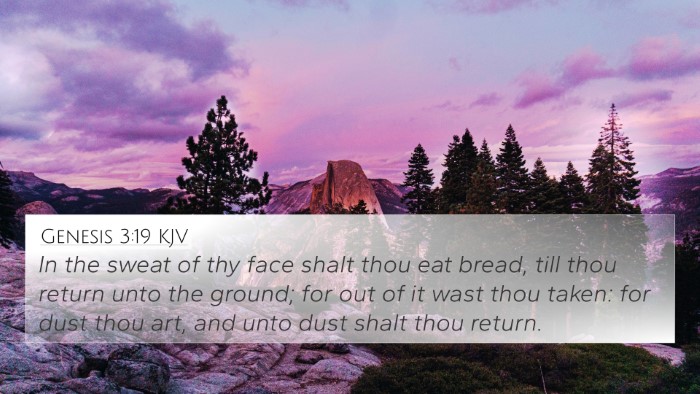Meaning and Interpretation of Job 34:15
Job 34:15 states, "If He should gather unto Himself His spirit and His breath; all flesh shall perish together, and man shall turn again unto dust."
Contextual Overview
This verse is situated in a discourse by Elihu, one of Job's friends, who attempts to explain God's justice and sovereignty over creation. Elihu emphasizes the necessity of God's spirit and breath for the existence of all living beings. The significance of this verse lies in the understanding of divine authority and the fragility of life.
Commentary Insights
-
Matthew Henry's Commentary:
Matthew Henry emphasizes that the life of every creature is dependent on God, who can take back the breath He gives. It highlights the transient nature of life and the omnipotence of God. Throughout scripture, the theme of humanity's dependence on divine provision is reiterated.
-
Albert Barnes' Notes:
Barnes notes that without God's sustaining spirit, all flesh will inevitably return to the dust, illustrating the mortality of man. This reinforces the theological perspective of human beings as created from dust, and apart from God's sustaining power, they cannot exist. This reflects the profound connection between creation and Creator.
-
Adam Clarke's Commentary:
Clarke expounds on the nature of God's spirit and the implications of its withdrawal. He underscores that life is a temporary gift, dependent on divine will, and posits that acknowledgment of this dependence should lead to humility before God. He connects this verse with the chorus of biblical texts that reflect on human mortality and divine transcendence.
Thematic Connections and Cross-References
Job 34:15 connects to various themes within Scripture regarding life, mortality, and the divine influence on existence. The following cross-references illuminate the thematic continuity:
- Genesis 2:7: "And the Lord God formed man of the dust of the ground, and breathed into his nostrils the breath of life; and man became a living soul."
- Psalms 104:29: "Thou hidest thy face, they are troubled: thou takest away their breath, they die, and return to their dust."
- Ecclesiastes 3:20: "All go unto one place; all are of the dust, and all turn to dust again."
- Acts 17:25: "Neither is worshipped with men's hands, as though he needed any thing, seeing he giveth to all life, and breath, and all things."
- Romans 11:36: "For of him, and through him, and to him, are all things: to whom be glory for ever. Amen."
- James 4:14: "Whereas ye know not what shall be on the morrow. For what is your life? It is even a vapor, that appeareth for a little time, and then vanisheth away."
- Isaiah 40:6-7: "The voice said, Cry. And he said, What shall I cry? All flesh is grass, and all the goodliness thereof is as the flower of the field. The grass withereth, the flower fadeth: because the spirit of the Lord bloweth upon it: surely the people is grass."
Understanding through Cross-References
To deepen understanding of Job 34:15, one may employ biblical cross-referencing tools. Such resources illustrate the interconnectedness of scriptural themes and enhance one's comprehension of the text. Below are some valuable resources and methods:
- Bible Concordance: A Bible concordance can help locate verses that discuss related themes of life, breath, and mortality.
- Bible Cross-Reference Guide: This guide can provide a systematic approach to tracing thematic links between scriptures.
- Cross-Reference Bible Study: Engaging in this method allows for comparative analysis of related verses, promoting deeper theological insights.
- Tools for Bible Cross-Referencing: Utilizing digital tools or written resources facilitates seamless tracking of shared themes across the scriptures.
- Inter-Biblical Dialogue: Explore the continuity and relationship between themes found in both the Old and New Testaments.
- Comprehensive Bible Cross-Reference Materials: Invest in comprehensive guides that catalogue verses based on thematic relevance and connections.
Conclusion
Job 34:15 serves as a profound reminder of human fragility and the sovereignty of God. In understanding this verse through commentaries and thematic connections, one can appreciate the intricate tapestry of biblical truth. This approach encourages further exploration of the relationships between various scriptures, inviting deeper faith and understanding among readers seeking wisdom within God's Word.










